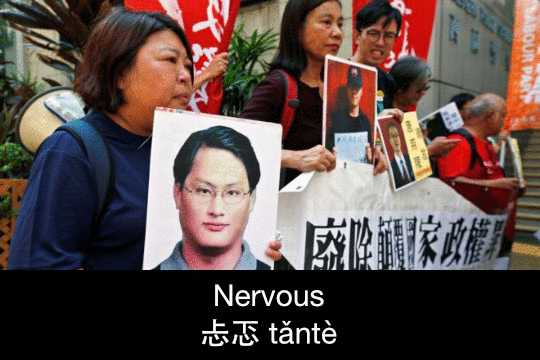Jangled nerves in Beijing and Taipei

Needles in your toddler’s arms, detention or eviction by a government that does not recognize your rights — these are some but not all of the fears keeping people awake at night right now:
Taiwanese activist’s indictment partly based on “subversive” Facebook posts
- On November 28, Taiwanese activist Lee Ming-che 李明哲 was convicted and sentenced to five years in prison on charges of subverting state power, by a court in Hunan Province.
- Lee’s Facebook posts were included as evidence in his indictment, according to a Quartz article on his trial.
- Wang Ting-yu 王定宇, a member of Taiwan’s parliament, tweeted, “It’s very common in Taiwan that we express our views on politics through internet, while China sees this kind of behavior as a threat to its regime. After Lee Ming-che’s case, I think our national security team should issue a warning to Taiwan citizens not to travel to China.”
- “This means anyone anywhere in the world is now liable to jail in China for any criticism made anywhere,” was the reaction of notable China law scholar Donald Clarke on Twitter to the Quartz report.
- The even-more-notable China law scholar Jerome Cohen tweeted, “Anyone on the Mainland, including Taiwanese and foreigners, who tries to speak, write or otherwise act in a way that questions the current Xi Jinping Party line, is now eligible for criminal conviction for subverting the regime.”
Evictions, child abuse, and censorship
Yet another child abuse scandal at a kindergarten and the swift, harsh evictions of many migrant workers from Beijing have poked at Chinese people’s always precarious sense of security over the last week (see our previous reporting).
- “Rich children go abroad, middle-class children get poked with needles, lower-class children get evicted from their homes” — this was a common Chinese social media response to the week of bad news, according to Quartz, which says that child abuse scandals “are reminding China’s middle class of its lack of power.”
- Financial Times Chinese has some interesting maps (legends in Chinese) of areas of Beijing slated for “cleaning up and regulating” (清理整治 qīnglǐ zhěngzhì), a euphemism for demolition and eviction.
- “They came banging and kicking” — the South China Morning Post says a number of Beijing airport workers have been swept up in the campaign and will be forced to leave Beijing.
- In a different article, the SCMP says there has been “a spike in Chinese censorship” over the migrant worker evictions and the kindergarten scandal.
On a lighter note
Futuristic library defends fake books
- A futuristic six-story library in Beijing’s neighboring city of Tianjin designed by Dutch architectural firm MVRDV attracted gasps when it opened in early November.
- And then it attracted derision, as it was revealed that the books lining its gorgeous atrium were fake. Now the South China Morning Post reports that an official defended the library, saying the fake books are there because of a permit approval bungle, and that the library has plenty of real books.
Stud panda
There are two types of people: those who will click through and those who will avoid an article published on opinion poll analysis site FiveThirtyEight titled The complicated legacy of a panda who was really good at sex (with stud panda’s family tree and panda cub photos).
Live Sinica Podcast with the New Yorker’s Jiayang Fan, December 18
If you’re in New York on December 18, please come to the Manhattan offices of the Cheung Kong Graduate School of Business (CKGSB) for a live Sinica Podcast recording: Kaiser and I will interview Jiayang Fan, staff writer at the New Yorker. Please RSVP to attend.






